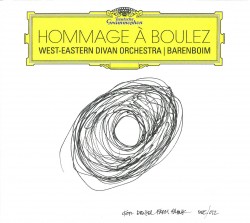 Hommage à Boulez
Hommage à Boulez
West-Eastern Divan Orchestra; Daniel Barenboim
Deutsche Grammophon 479 7160
The West-Eastern Divan Orchestra is named after an anthology of poems by Goethe, inspired by a translation of the Persian poet Hafez. Goethe’s late work was a symbol of reciprocity between Occident and Orient, between Latin and Persian, Christian and Muslim, and German and Middle Eastern cultures. Co-founder Daniel Barenboim approached the 1999 formation of the Seville-based youth orchestra with similar intentions, bringing together musicians from Egypt, Iran, Israel, Jordan, Lebanon, Palestine, Syria and Spain, to promote principles of coexistence and dialogue between Israelis and Palestinians. In 2006, filmmaker Paul Smaczny made a documentary about the group entitled Knowledge Is the Beginning.
Having performed with Boulez since their 1964 concert of Bartók’s Piano Concerto No.1, (when Barenboim was 21) he chose to honour their working relationship with the 2-CD Hommage à Boulez, released in March 2017, a year after the composer’s death. The release of the recording coincided with the opening of the Pierre Boulez Saal, a Frank Gehry-designed chamber music hall in the Barenboim-Said Akademie in Berlin, which included the first concert of the newly formed Boulez Ensemble. The first CD contains live performances of the West-Eastern Divan Orchestra playing at the 2012 Proms in London, and the second includes their performances of pieces from Boulez’ 85th birthday celebration at the Berlin Staatsoper Unter den Linden in 2010.
Although Boulez conducts the live recording of Le marteau sans maître (at least his fifth recording of the piece, and second with contralto Hilary Summers (check out her website!)), I was most interested to hear a recent recording of Boulez’ music that wasn’t conducted by him, since the composer controlled the majority of recordings of his music. Considering the performances alone, this is a fantastic recording. Add to it that this is an orchestra made up of young musicians in an ensemble with admirable intent, and the recording is that much more impressive.
Barenboim conducts an energetically perambulant performance of the 49-minute Dérive 2, for 11 instruments. Jussef Eisa’s virtuosity is immediately evident in his live recording of Dialogue de l’ombre double, for clarinet, live electronics and pre-recorded tape, with off-stage piano providing resonance of the live clarinet sound projected from a speaker into the soundboard of the piano and redirected to the loudspeakers in the hall. The IRCAM live electronics team handles the computational side of this performance, as well as Anthèmes 2, demonstrating the most sophisticated instrument/computer interactions produced at IRCAM’s Paris research and creation facility. Hassan Moataz El Molla contributes a clear and elegant reading of Messagesquisse, for cello solo and six cellos. In their entirety, the flexible and colourful interpretations presented on this hommage support Stravinsky’s anecdote that Boulez is “Webern’s music sounding like Debussy.”



